Mastering Socialization: Top Strategies for Your German Shepherd Puppy
Hello dog lovers, socializing your German Shepherd puppy is important. It means helping them get used to new things when they’re young, between 7 to 16 weeks old. This helps them become friendly and confident as they grow up. We’ll talk about why socializing is so important, how to do it right, and some easy tips to help your German Shepherd puppy become a happy and friendly dog.
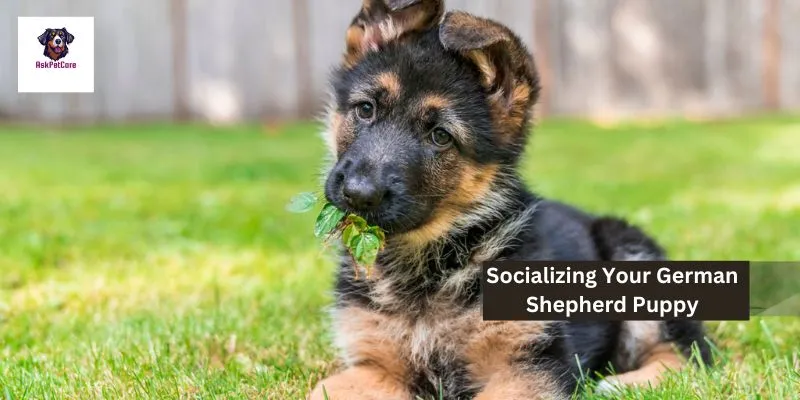
Introduction to Socializing German Shepherd Puppy:
Why Socialization Matters for German Shepherd Puppies
When you bring home a fluffy German Shepherd puppy, you’re not just getting a cute ball of fur; you’re welcoming a new member into your family. Just like kids, puppies need to learn and grow, and one of the most important things they need to learn is how to socialize.
What is Socialization and Why is it Important?
Socialization is like puppy school—it’s where they learn how to be good boys and girls! When we talk about socializing puppies, we mean introducing them to lots of different people, places, and things. This helps them become confident and friendly adults.
Building the Foundation for a Well-Rounded Dog.
Think of socialization as laying the groundwork for your puppy’s future. By exposing them to all sorts of experiences when they’re young, you’re helping them grow into well-rounded and well-behaved adult dogs. Socialization is like giving them a superpower—it helps them handle new situations with ease and grace.
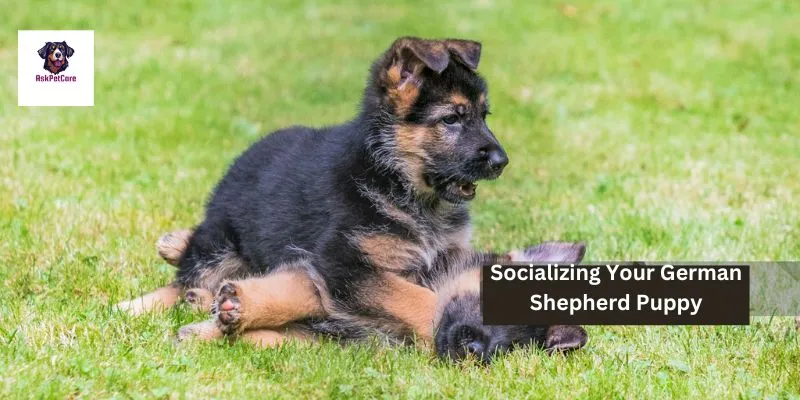
How Proper Socialization Shapes Behavior.
Imagine if you only ever met people who looked and acted exactly like you. You might feel a little nervous or scared when you finally met someone different! It’s the same for puppies. By introducing them to lots of different people, animals, and environments, we’re teaching them that the world is a fun and exciting place, not something to be afraid of.
The Benefits of a Well-Socialized German Shepherd.
A well-socialized German Shepherd puppy is a joy to be around. They’re confident, friendly, and eager to explore the world around them. They’re not afraid of new experiences or people, and they know how to behave in all sorts of situations. In short, they’re the perfect companion!
Conclusion
So, why is socialization important for German Shepherd puppies? Because it’s the key to unlocking their full potential! By giving them the tools they need to navigate the world with confidence, you’re setting them up for a lifetime of happiness and success.

When to Start Socializing Your German Shepherd Puppy:
Understanding the Critical Socialization Period
When your German Shepherd puppy first comes home, they’re like sponges, soaking up everything around them. This is the critical socialization period, and it lasts from about 7 to 16 weeks of age. During this time, their brains are super receptive to new experiences, making it the perfect time to start socializing.
Why Early Socialization Matters
Starting socialization early is like giving your puppy a head start in life. It helps them learn how to be confident and well-behaved in all sorts of situations. Just like kids, puppies need to learn how to interact with the world around them, and the earlier they start, the better.
The Importance of Consistency
Socialization isn’t a one-time thing—it’s an ongoing process. That’s why it’s so important to start early and keep it up throughout your puppy’s first year. By exposing them to lots of different people, places, and things regularly, you’re helping them build the skills they need to thrive as adults.
Building a Strong Foundation
Think of socialization as building a strong foundation for your puppy’s future. By starting early and continuing throughout their first year, you’re giving them the tools they need to navigate the world with confidence. Whether they’re meeting new people, exploring new places, or encountering unfamiliar animals, they’ll be ready for anything.
Setting Your Puppy Up for Success
Starting socialization early isn’t just about making sure your puppy is well-behaved—it’s also about keeping them safe. A well-socialized puppy is less likely to be scared or anxious in new situations, reducing the risk of behavior problems down the road. Plus, they’ll be more comfortable around strangers, making vet visits and grooming appointments a breeze.
Conclusion
So, when should you start socializing your German Shepherd puppy? The answer is simple: as soon as possible! By starting early and continuing throughout their first year, you’ll be giving your puppy the best possible start in life. So grab that leash and get out there—your puppy will thank you for it.
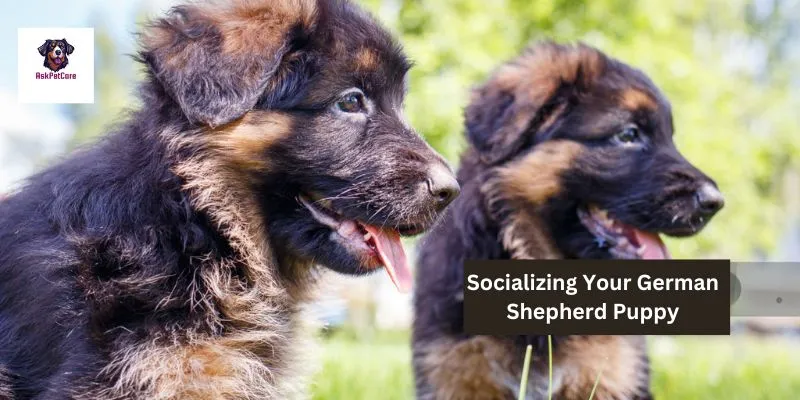
Understanding Your German Shepherd Puppy’s Needs:
Getting to Know German Shepherds
German Shepherds are a special breed of dog known for their intelligence, loyalty, and versatility. Understanding their unique characteristics and temperament is essential for providing them with the best care and upbringing.
Breed Characteristics of German Shepherds
Intelligence and Trainability
German Shepherds are incredibly smart dogs. They pick up new commands and tasks quickly, making them popular choices for various roles such as police work, search and rescue, and therapy.
Loyalty and Protective Instincts
One of the defining traits of German Shepherds is their unwavering loyalty to their family. They are natural protectors, often forming strong bonds with their owners and taking their role as guardians seriously.
Energetic and Athletic
German Shepherds are high-energy dogs with a need for physical and mental stimulation. They excel in activities like agility, obedience, and tracking, but they also enjoy regular exercise and playtime to keep them happy and healthy.
Alertness and Watchfulness
With their keen senses and alert nature, German Shepherds make excellent watchdogs. They are always on the lookout for potential threats and will alert their owners to any unusual activity or intruders.
How Breed Traits Influence Socialization
Guardian Instincts and Wariness
German Shepherds’ natural protective instincts can sometimes make them wary of strangers or unfamiliar situations. This wariness may require extra care and patience during the socialization process to ensure they feel safe and comfortable in new environments.
Energy and Enthusiasm
Their high energy levels and enthusiasm for life make German Shepherds eager to explore the world around them. However, this energy can sometimes be overwhelming for other dogs or people, requiring careful socialization to teach them appropriate behavior and boundaries.
Loyalty and Bonding
German Shepherds form strong bonds with their family members, making them incredibly loyal companions. While this loyalty is a wonderful trait, it can also lead to separation anxiety or overprotectiveness if not properly socialized to spend time apart from their owners or interact with strangers positively.
Adaptability and Versatility
Despite their protective instincts, German Shepherds are adaptable dogs capable of thriving in various environments and roles. Proper socialization helps them develop the confidence and adaptability needed to handle new situations with ease and grace.
Conclusion
Understanding the breed characteristics and temperament of German Shepherds is key to providing effective socialization. By recognizing their unique traits and needs, you can tailor the socialization process to help your puppy grow into a well-adjusted and confident adult dog. With patience, consistency, and love, you can nurture your German Shepherd puppy’s personality and ensure they become a cherished member of your family.
My related topics are:
german-shepherd-dog-breed-a-z-informations:
german-shepherd-husky-mix-temperament-a-complete:
black-german-shepherd-temperament-a-closer-look:
Navigating Challenges in Socializing Your German Shepherd Puppy:
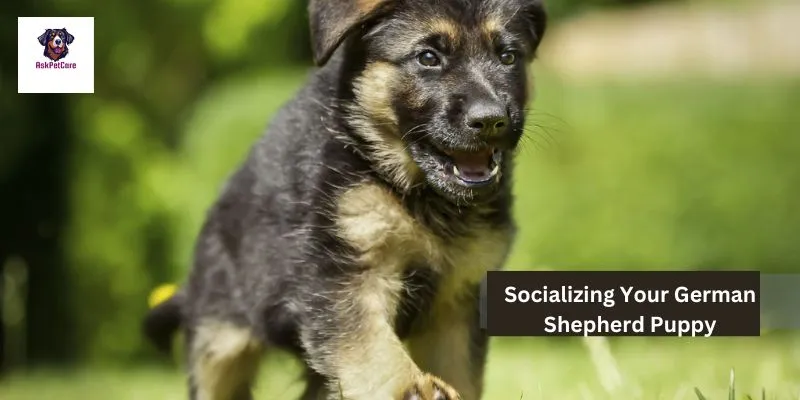
Understanding Common Challenges
German Shepherd puppies, like any breed, may face specific challenges during the socialization process. Recognizing and addressing these challenges is essential for ensuring a positive and effective socialization experience.
- Strong Guardian Instincts
Description: German Shepherds have innate protective instincts that can manifest as wariness or suspicion towards strangers. They may perceive unfamiliar people or animals as potential threats, leading to cautious or defensive behavior.
Insights: Due to their strong guardian instincts, German Shepherds may require gradual exposure and positive reinforcement to help them feel safe and comfortable around new individuals. Building trust through gentle interactions and rewarding calm behavior can help alleviate their concerns.
- Sensitivity to Environment
Description: German Shepherds are sensitive dogs who may become overwhelmed or anxious in new or unfamiliar environments. Loud noises, crowded spaces, or sudden changes in surroundings can trigger stress responses in sensitive puppies.
Insights: To support German Shepherd puppies with sensitivity to their environment, socialization should be approached gradually and with patience. Introducing them to new experiences in a controlled and reassuring manner can help build confidence and reduce anxiety over time.
- Selective Socialization Tendencies
Description: Some German Shepherd puppies may exhibit selective socialization tendencies, preferring certain individuals or animals over others. They may be cautious or reserved in their interactions, particularly with unfamiliar people or dogs.
Insights: Tailored socialization approaches are essential for addressing selective tendencies in German Shepherd puppies. Providing opportunities for positive interactions with a diverse range of people and animals, along with gentle encouragement and reinforcement, can help broaden their social circle and reduce apprehension.
- High Energy Levels
Description: German Shepherds are energetic and active dogs, often exhibiting high levels of enthusiasm and exuberance. While this energy can be beneficial for physical activity and training, it may also pose challenges during socialization, such as difficulty maintaining focus or controlling impulses.
Insights: Incorporating structured activities and exercises into socialization sessions can help channel German Shepherd puppies’ energy in a positive direction. Engaging in interactive games, obedience training, and controlled play can promote mental stimulation and reinforce desired behaviors.
- Protective Behavior Towards Family
Description: German Shepherds are fiercely loyal to their families and may display protective behavior towards their owners or household members. While this loyalty is admirable, it can sometimes lead to overprotectiveness or territoriality, especially in new or unfamiliar situations.
Insights: To address protective behavior towards family members, socialization should focus on teaching appropriate boundaries and promoting positive interactions with visitors or strangers. Introducing controlled scenarios where the puppy can observe and interact with new individuals while feeling secure within their family unit can help mitigate protective tendencies.
- Distraction During Training
Description: German Shepherds are highly intelligent dogs with a keen ability to learn and problem-solve. However, their intelligence can also make them easily distracted, particularly in stimulating or unfamiliar environments, which may impact training and socialization efforts.
Insights: Implementing consistent training techniques and maintaining a calm and structured environment during socialization sessions can help minimize distractions for German Shepherd puppies. Breaking down training tasks into manageable steps and providing plenty of positive reinforcement for focused behavior can enhance their learning experience.
- Prey Drive
Description: German Shepherds may exhibit a strong prey drive, leading to chasing or fixation on smaller animals or moving objects. This instinct can pose challenges during socialization, especially when encountering other pets or wildlife.
Insights: Managing and redirecting prey drive during socialization requires vigilant supervision and proactive training methods. Using leash control, recall commands, and positive reinforcement to redirect attention away from potential triggers can help German Shepherd puppies learn to control their impulses and engage in appropriate social behavior.
- Fear of Novel Stimuli
Description: German Shepherd puppies may experience fear or apprehension when confronted with unfamiliar stimuli, such as loud noises, unfamiliar objects, or sudden movements. This fear response can hinder socialization progress and may require gradual desensitization techniques.
Insights: Introducing new stimuli in a controlled and gradual manner, paired with positive reinforcement and rewards, can help German Shepherd puppies overcome fear and build confidence. Creating a safe and reassuring environment where they can explore and interact with novel stimuli at their own pace is essential for successful socialization.
- Individual Personality Differences
Description: Each German Shepherd puppy has a unique personality and temperament influenced by genetics, early experiences, and environmental factors. Some puppies may be naturally outgoing and sociable, while others may be more reserved or cautious in their interactions.
Insights: Recognizing and respecting individual personality differences is crucial for tailoring socialization approaches to meet each puppy’s specific needs. Observing their behavior cues, preferences, and comfort levels can help determine the most effective strategies for promoting positive social experiences and building trust.
- Developmental Phases and Growth
Description: German Shepherd puppies undergo various developmental phases and growth stages as they mature, each presenting unique challenges and opportunities for socialization. From the early weeks of puppyhood to adolescence and beyond, their socialization needs evolve over time.
Insights: Adapting socialization strategies to align with the puppy’s developmental stage and growth trajectory is essential for ensuring continued progress and success. Consistently reassessing their socialization experiences and adjusting approaches as needed can help address emerging challenges and support their ongoing development into well-adjusted adult dogs.
Conclusion
Successfully socializing a German Shepherd puppy requires understanding and addressing common challenges that may arise during the process. By recognizing breed-specific traits, individual differences, and developmental factors, tailored socialization approaches can be implemented to promote positive social experiences and foster a confident and well-behaved companion. With patience, consistency, and proactive guidance, German Shepherd puppies can overcome challenges and thrive in their socialization journey.
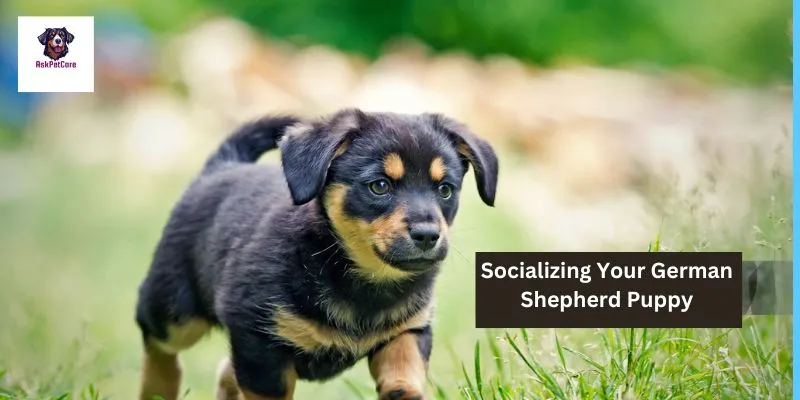
20-Effective Socialization Techniques for German Shepherd Puppies:
- Controlled Exposure to New Environments
Description: Gradually introduce your German Shepherd puppy to different environments, starting with quieter and less overwhelming locations and gradually progressing to busier or more stimulating areas.
Technique: Begin with short outings to familiar places like your backyard or a quiet park. Slowly increase the duration and complexity of outings, gradually exposing your puppy to new sights, sounds, and smells while ensuring they feel safe and comfortable.
- Gentle Introduction to New People
Description: Allow your puppy to meet a variety of people, including different ages, genders, and appearances, to build confidence and trust in social interactions.
Technique: Invite friends and family members to visit your home and interact with your puppy calmly and positively. Encourage gentle petting and offer treats as rewards for friendly behavior towards new people.
- Positive Reinforcement Training Methods
Description: Utilize positive reinforcement techniques, such as treats, praise, and toys, to reward desired behaviors and encourage your puppy to associate social interactions with positive outcomes.
Technique: When your puppy displays calm and friendly behavior during socialization, immediately praise and reward them with a treat or favorite toy. Consistently reinforce positive behaviors to reinforce the importance of socializing.
- Structured Playdates with Other Dogs
Description: Arrange controlled playdates with other friendly and vaccinated dogs to provide opportunities for your puppy to learn appropriate social cues and manners.
Technique: Organize playdates with known, well-behaved dogs in a safe and enclosed environment. Supervise interactions closely, intervene if necessary, and reward positive play behaviors such as sharing toys or taking turns.
- Puppy Socialization Classes
Description: Enroll your puppy in puppy socialization classes led by experienced trainers or behaviorists to facilitate supervised interactions with other puppies and learn essential social skills.
Technique: Attend group classes specifically designed for young puppies, focusing on positive reinforcement training methods and controlled socialization exercises. Follow the guidance of the instructor and participate actively in class activities.
- Exposure to Different Sounds
Description: Expose your puppy to various sounds, including household noises, traffic, and fireworks, to desensitize them and prevent fear or anxiety-related behaviors.
Technique: Gradually introduce recorded sounds at a low volume while engaging in calm and enjoyable activities with your puppy. Increase the volume gradually over time as your puppy becomes more accustomed to the noises.
- Introduction to Different Surfaces
Description: Allow your puppy to walk on different surfaces such as grass, concrete, sand, and carpet to develop confidence and coordination.
Technique: Take your puppy for walks in diverse environments and encourage them to explore different surfaces with their paws. Use treats and praise to reinforce brave behavior and help them feel comfortable on unfamiliar surfaces.
- Positive Association with Veterinary Visits
Description: Create positive associations with veterinary visits by introducing your puppy to the veterinary clinic gradually and rewarding calm behavior during appointments.
Technique: Take your puppy to the veterinary clinic for brief visits outside of scheduled appointments. Allow them to explore the waiting area, interact with staff members, and receive treats and praise for remaining calm and cooperative.
- Handling Exercises
Description: Practice gentle handling exercises with your puppy to acclimate them to being touched and examined, which is essential for grooming, veterinary care, and everyday interactions.
Technique: Regularly handle your puppy’s paws, ears, tail, and mouth in a gentle and reassuring manner. Pair handling exercises with treats and praise to create positive associations and teach your puppy to trust and cooperate during grooming and vet visits.
- Desensitization to Grooming Tools
Description: Gradually introduce grooming tools such as brushes, nail clippers, and hair dryers to your puppy to familiarize them with grooming routines and reduce fear or discomfort.
Technique: Present grooming tools to your puppy one at a time and allow them to sniff and investigate without pressure. Pair the presence of each tool with treats and praise, gradually increasing the level of interaction as your puppy becomes more comfortable.
- Introduction to Different Animals
Description: Expose your puppy to a variety of animals, including cats, rabbits, and livestock, to teach them how to interact appropriately with different species.
Technique: Arrange supervised meetings with other animals in controlled environments, such as a friend’s home or a petting zoo. Monitor your puppy’s behavior closely and intervene if necessary to prevent rough play or aggression.
- Socialization through Car Rides
Description: Take your puppy on short car rides to help them acclimate to traveling in a vehicle and prevent fear or anxiety associated with car trips.
Technique: Start with brief car rides around the neighborhood, gradually increasing the duration and distance as your puppy becomes more comfortable. Provide treats and praise for calm behavior during car rides to reinforce positive associations.
- Exposure to Different Age Groups
Description: Expose your puppy to people of different ages, including children, adults, and seniors, to teach them how to interact politely and respectfully with individuals of all ages.
Technique: Arrange visits with friends or family members representing different age groups and encourage gentle interactions between your puppy and each person. Supervise closely to ensure safety and provide guidance on appropriate behavior.
- Socialization in Various Environments
Description: Expose your puppy to a variety of environments, including urban areas, parks, beaches, and rural settings, to help them adapt to different surroundings and stimuli.
Technique: Take your puppy on walks or outings to explore different environments, paying attention to their reactions and comfort level in each setting. Use treats and praise to reward confident and relaxed behavior in new environments.
- Positive Interaction with Strangers
Description: Teach your puppy to interact politely with strangers by providing opportunities for controlled greetings and encouraging friendly behavior towards unfamiliar individuals.
Technique: Invite friends, neighbors, or acquaintances to greet your puppy in a calm and non-threatening manner. Use treats and praise to reinforce polite greetings and discourage jumping or excessive excitement during interactions with strangers.
- Exposure to Water and Swimming
Description: Introduce your puppy to water gradually and teach them basic swimming skills to build confidence and ensure safety around bodies of water.
Technique: Start by allowing your puppy to wade in shallow water, gradually increasing the depth as they become more comfortable. Support your puppy as they practice swimming and provide positive reinforcement for their efforts.
- Participation in Community Events
Description: Attend community events, such as pet-friendly festivals or outdoor markets, to expose your puppy to different sights, sounds, and people in a social setting.
Technique: Take your puppy to community events on a leash and allow them to observe and interact with the environment at their own pace. Use treats and praise to reward calm and confident behavior during outings.
- Introduction to Household Appliances
Description: Familiarize your puppy with common household appliances, such as vacuum cleaners, blenders, and doorbells, to prevent fear or anxiety-related reactions to everyday noises.
Technique: Gradually introduce household appliances one at a time, starting with quieter devices and gradually progressing to louder or more startling noises. Pair the presence of each appliance with treats and praise to create positive associations and reduce fearfulness.
- Socialization with Different Breeds and Sizes of Dogs
Description: Expose your puppy to dogs of different breeds, sizes, and temperaments to teach them how to interact appropriately and confidently with a diverse range of canine companions.
Technique: Arrange playdates or attend dog-friendly parks where your puppy can interact with dogs of various breeds and sizes. Monitor their interactions closely and intervene if necessary to prevent rough play or conflicts.
- Incorporation of Novel Toys and Objects
Description: Introduce your puppy to a variety of toys, objects, and stimuli to stimulate their curiosity, encourage exploration, and promote mental enrichment.
Technique: Provide your puppy with a selection of toys, puzzles, and interactive games to engage their senses and encourage play. Rotate toys regularly to maintain novelty and prevent boredom, and use treats or praise to reward curiosity and exploration of new objects.
Conclusion
Effective socialization techniques for German Shepherd puppies involve a combination of controlled exposure, positive reinforcement, structured activities, and gentle desensitization. By gradually introducing your puppy to new environments, people, animals, and stimuli in a positive and supportive manner, you can help them develop confidence, adaptability, and social skills essential for a happy and well-adjusted adulthood. With patience, consistency, and dedication, you can ensure that your German Shepherd puppy grows into a confident, friendly, and well-socialized companion.
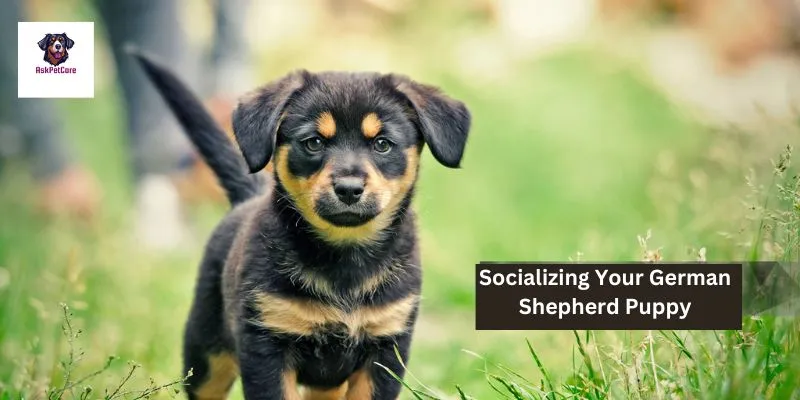
Creating Positive Socialization Experiences for Your German Shepherd Puppy:
Emphasizing Positive Experiences
- Importance of Positivity
Description: Positive socialization experiences are crucial for building your German Shepherd puppy’s confidence and trust in new situations. Emphasizing positivity during socialization sets the foundation for a happy and well-adjusted adult dog.
Tips:
- Approach socialization with a positive mindset, focusing on creating enjoyable experiences for your puppy.
- Use treats, praise, and toys to reinforce desired behaviors and reward your puppy for their efforts during socialization.
- Patience and Encouragement
Description: Be patient and encouraging during socialization activities, understanding that each puppy learns at their own pace. Offer gentle guidance and support to help your puppy feel safe and comfortable during new experiences.
Tips:
- Avoid rushing your puppy or pushing them beyond their comfort level.
- Offer reassurance and praise for brave behavior, even if it’s small steps forward.
- Consistency and Routine
Description: Establishing a consistent socialization routine helps your puppy feel secure and confident in their surroundings. Regular exposure to new people, places, and experiences builds familiarity and reduces anxiety.
Tips:
- Incorporate socialization activities into your puppy’s daily routine, such as short outings or playdates.
- Consistency in socialization helps reinforce positive associations and builds your puppy’s confidence over time.
Creating a Safe Environment
- Supervision and Control
Description: Maintaining supervision and control during socialization activities ensures your puppy’s safety and prevents overwhelming or negative experiences. Being present and attentive allows you to intervene if necessary and guide your puppy through new situations.
Tips:
- Always supervise interactions between your puppy and unfamiliar people or animals.
- Use a leash or harness to maintain control during outings and prevent your puppy from wandering into potentially dangerous situations.
- Gradual Exposure
Description: Introduce new environments, stimuli, and experiences to your puppy gradually to prevent fear or overwhelm. Gradual exposure allows your puppy to acclimate at their own pace and build confidence over time.
Tips:
- Start with low-stress environments and gradually increase the complexity and intensity of socialization activities.
- Watch for signs of discomfort or stress in your puppy, and be prepared to adjust the level of exposure accordingly.
- Positive Reinforcement
Description: Using positive reinforcement techniques encourages your puppy to associate socialization with enjoyable rewards. Rewarding desired behaviors reinforces positive associations and encourages your puppy to engage in social interactions willingly.
Tips:
- Offer treats, praise, or toys as rewards for calm and friendly behavior during socialization.
- Use positive reinforcement consistently to reinforce positive experiences and encourage your puppy’s confidence.
Conclusion
Creating positive socialization experiences for your German Shepherd puppy is essential for their emotional well-being and development. By emphasizing positivity, patience, and consistency, and providing a safe and supportive environment, you can help your puppy navigate new experiences with confidence and joy. With dedication and care, you’ll set the stage for a lifetime of happy adventures with your well-socialized companion.
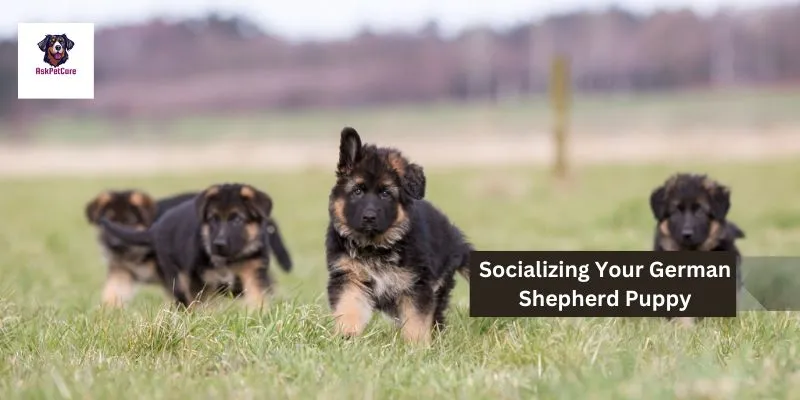
Socialization Do’s and Don’ts for German Shepherd Puppy Owners:
Dos
- Do Start Early
Description: Start socializing your German Shepherd puppy as soon as possible, ideally between 7 and 16 weeks of age. Early socialization lays the foundation for positive behaviors and confidence in new situations.
Tips:
- Begin socialization with gentle introductions to people, animals, and environments in a controlled and positive manner.
- Do Exposed to Various Environments
Description: Expose your puppy to a variety of environments, including urban areas, parks, beaches, and rural settings. Experiencing different environments helps your puppy adapt to diverse surroundings and stimuli.
Tips:
- Gradually introduce your puppy to new environments, starting with quieter and less overwhelming locations.
- Use positive reinforcement to create positive associations with each new environment.
- Do Encourage Positive Interactions
Description: Encourage positive interactions with people, animals, and objects during socialization. Reward calm and friendly behavior with treats, praise, or toys to reinforce positive associations.
Tips:
- Allow your puppy to approach new people and animals at their own pace, using treats and praise to reward confident and friendly behavior.
- Supervise interactions closely to ensure safety and intervene if necessary to prevent negative experiences.
- Do Provide Ongoing Socialization Opportunities
Description: Continue socializing your German Shepherd puppy throughout their first year and beyond. Ongoing socialization helps reinforce positive behaviors and ensures your puppy remains confident and adaptable in various situations.
Tips:
- Incorporate socialization activities into your puppy’s daily routine to maintain consistency and reinforce positive associations.
- Attend puppy socialization classes or organize playdates with other vaccinated and friendly dogs to provide ongoing socialization opportunities.
- Do Use Positive Reinforcement Training
Description: Use positive reinforcement training methods to encourage desired behaviors during socialization. Reward your puppy with treats, praise, or toys for exhibiting calm and friendly behavior in new situations.
Tips:
- Use high-value treats to motivate your puppy during socialization and reinforce positive behaviors.
- Keep training sessions short and enjoyable to maintain your puppy’s engagement and focus.
Don’ts
- Don’t Force Interactions
Description: Avoid forcing your puppy to interact with people, animals, or environments if they show signs of fear or discomfort. Forcing interactions can create negative associations and increase anxiety in your puppy.
Tips:
- Allow your puppy to approach new people and animals at their own pace, respecting their comfort level and boundaries.
- Provide reassurance and encouragement to help build your puppy’s confidence without pressure.
- Don’t Overwhelm with Stimuli
Description: Avoid overwhelming your puppy with too many stimuli or experiences at once. Overwhelming stimuli can lead to stress, fear, or anxiety and hinder the socialization process.
Tips:
- Introduce new stimuli gradually and in manageable doses to prevent overwhelm.
- Watch for signs of stress or discomfort in your puppy, such as trembling, panting, or avoiding eye contact, and adjust the level of exposure accordingly.
- Don’t Skip Vaccination Protocols
Description: Don’t skip or delay your puppy’s vaccination protocols before exposing them to other dogs or public spaces. Vaccinations protect your puppy from contagious diseases and ensure their health and safety during socialization.
Tips:
- Follow your veterinarian’s vaccination schedule and recommendations to ensure your puppy is adequately protected before engaging in socialization activities.
- Avoid exposing your puppy to unknown or unvaccinated dogs until they have completed their vaccination series.
- Don’t Reinforce Fearful Behavior
Description: Avoid reinforcing fearful behavior by coddling or comforting your puppy excessively when they display signs of fear or anxiety. Excessive reassurance can inadvertently reinforce fearful behavior and make it harder for your puppy to overcome their fears.
Tips:
- Remain calm and composed when your puppy encounters new stimuli or experiences fear.
- Use positive reinforcement to redirect your puppy’s focus and encourage brave behavior, rewarding calm and confident responses with treats, praise, or toys.
- Don’t Overlook Individual Needs
Description: Don’t overlook your puppy’s individual needs, preferences, and comfort level during socialization. Each puppy is unique, and socialization approaches should be tailored to meet their specific needs and personality.
Tips:
- Pay attention to your puppy’s body language and behavior cues to gauge their comfort level and adjust socialization activities accordingly.
- Be patient and adaptable, accommodating your puppy’s individual pace and preferences to ensure a positive and successful socialization experience.
Conclusion
Following these socialization do’s and don’ts will help you navigate the socialization process effectively and ensure your German Shepherd puppy develops into a confident, well-adjusted, and sociable companion. By emphasizing positive experiences, providing a safe and supportive environment, and avoiding common pitfalls, you’ll set the stage for a lifetime of happy adventures with your furry friend.
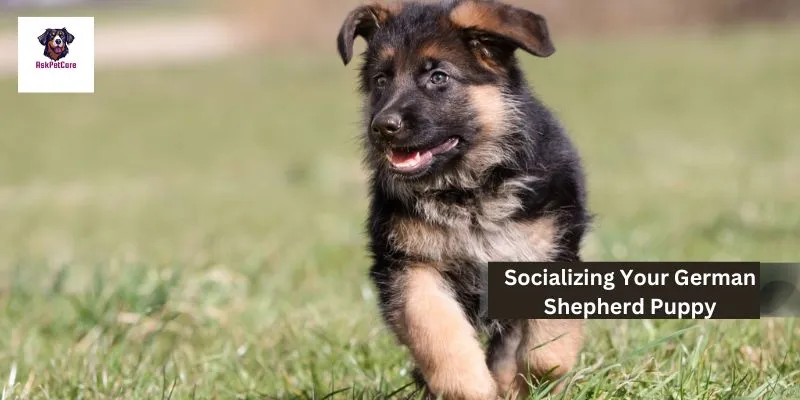
Tailoring Socialization to Your German Shepherd Puppy’s Individual Needs:
Understanding Your Puppy’s Unique Needs.
- Importance of Individuality
Description: Recognizing and accommodating your German Shepherd puppy’s personality, temperament, and needs is crucial for successful socialization. Each puppy is unique, with their own preferences, fears, and comfort levels.
Tips:
- Take the time to observe and understand your puppy’s behavior, reactions, and body language during socialization activities.
- Tailor socialization techniques and approaches to suit your puppy’s individual characteristics and ensure a positive experience.
- Building Trust and Confidence
Description: Building trust and confidence is essential for effective socialization. By understanding your puppy’s individual needs and providing a supportive environment, you can help them feel safe and secure during new experiences.
Tips:
- Create positive associations with socialization by using treats, praise, and toys to reward brave and confident behavior.
- Be patient and encouraging, allowing your puppy to progress at their own pace and providing reassurance as needed.
Adapting Socialization Techniques
- Gradual Exposure
Description: Adapt socialization techniques based on your puppy’s comfort level and responses. Gradually expose your puppy to new environments, people, and stimuli, allowing them to acclimate at their own pace.
Tips:
- Start with low-stress environments and gradually increase the complexity and intensity of socialization activities.
- Watch for signs of stress or discomfort in your puppy, such as trembling, panting, or avoidance, and adjust the level of exposure accordingly.
- Positive Reinforcement
Description: Use positive reinforcement techniques tailored to your puppy’s individual preferences and motivations. Reward desired behaviors with treats, praise, or toys to reinforce positive associations and encourage continued progress.
Tips:
- Identify your puppy’s favorite treats, toys, or activities and use them as rewards during socialization.
- Adapt your reinforcement methods based on your puppy’s responses, experimenting with different rewards to find what motivates them the most.
- Respectful Interactions
Description: Respect your puppy’s boundaries and comfort level during socialization interactions. Avoid pushing them beyond their limits or forcing interactions that cause fear or discomfort.
Tips:
- Allow your puppy to approach new people, animals, and environments at their own pace, providing gentle guidance and reassurance as needed.
- Respect your puppy’s signals and cues, such as turning away, licking their lips, or growling, as indications of discomfort or stress.
- Individualized Training
Description: Tailor training and socialization exercises to suit your puppy’s unique learning style and abilities. Adapt training methods and techniques to accommodate your puppy’s strengths and areas for improvement.
Tips:
- Experiment with different training methods, such as shaping, luring, or capturing, to find what resonates best with your puppy.
- Be patient and persistent, breaking down training tasks into manageable steps and celebrating each small success along the way.
Conclusion
Tailoring socialization to your German Shepherd puppy’s individual needs is essential for building trust, confidence, and positive associations with new experiences. By recognizing and accommodating your puppy’s unique personality, temperament, and comfort level, you can create a personalized approach to socialization that fosters a happy, confident, and well-adjusted companion. With patience, understanding, and adaptability, you’ll set the stage for a lifetime of joyful adventures with your furry friend.
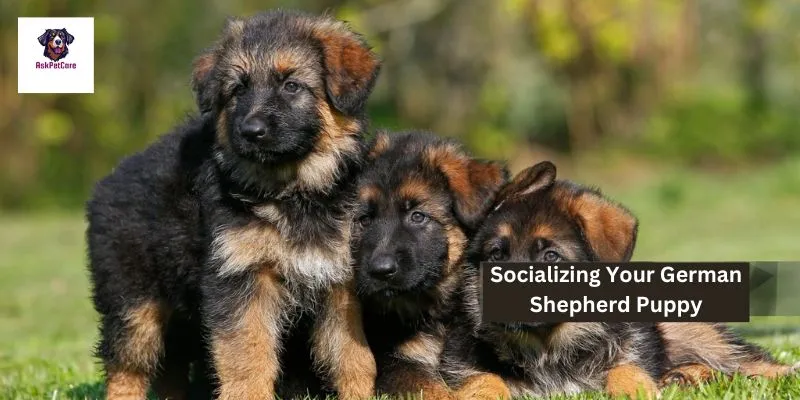
Socialization Beyond Puppyhood: Nurturing a Lifelong Social Companion:
Importance of Ongoing Socialization
- Building on Foundations
Description: Emphasize the importance of continuing socialization efforts beyond puppyhood to reinforce positive behaviors and maintain your German Shepherd’s confidence and adaptability.
Tips:
- Recognize that socialization is an ongoing process that evolves as your dog matures.
- Build upon the foundation established during puppyhood by providing regular opportunities for positive social interactions.
- Preventing Regression
Description: Highlight the risk of regression in social skills if socialization efforts are neglected as your German Shepherd grows older. Reinforce the need for consistent socialization to prevent behavioral issues and ensure a well-adjusted adult dog.
Tips:
- Understand that dogs, like humans, can experience setbacks in social skills if not exposed to new experiences regularly.
- Maintain a proactive approach to socialization to prevent regression and address any emerging behavioral concerns promptly.
Suggestions for Maintaining Social Skills
- Regular Outings and Activities
Description: Encourage regular outings and activities to expose your German Shepherd to new environments, people, and experiences. Incorporate walks, hikes, visits to dog-friendly parks, and interactive play sessions to keep your dog mentally stimulated and socially engaged.
Tips:
- Schedule regular outings and adventures to provide opportunities for socialization and exploration.
- Engage in activities that cater to your dog’s interests and energy levels, ensuring a balance between mental and physical stimulation.
- Continued Positive Reinforcement
Description: Continue using positive reinforcement techniques to reward desired behaviors and reinforce positive associations with social interactions. Use treats, praise, and toys to encourage confidence and cooperation in various social settings.
Tips:
- Maintain a consistent reward system to reinforce desirable behaviors during socialization.
- Adapt your reinforcement methods based on your dog’s preferences and motivation, ensuring effective communication and understanding.
Conclusion
In conclusion, ongoing socialization efforts are essential for nurturing a well-rounded and confident German Shepherd throughout their life. By prioritizing socialization beyond puppyhood, you can prevent regression in social skills and maintain your dog’s confidence and adaptability in various situations. Remember to continue building on the foundations established during puppyhood, provide regular opportunities for positive social interactions, and use positive reinforcement to encourage desirable behaviors. With dedication and consistency, you can ensure that your German Shepherd remains a happy, social, and well-adjusted companion for years to come.

15 Reasons Why Socialization Is Important For German Shepherds Puppy:
Socialization is crucial for German Shepherd puppies due to their breed characteristics and their potential roles as companions, working dogs, or service animals. Here are ten reasons why socialization is important for German Shepherd puppies:
- Behavioral development: Proper socialization helps shape a German Shepherd puppy’s behavior, leading to a well-adjusted and confident adult dog.
- Reduced fear and anxiety: Early exposure to various stimuli helps prevent fear and anxiety-related behaviors in German Shepherds, such as aggression or nervousness.
- Improved obedience: Socialized puppies are more likely to respond positively to training and obey commands, making them easier to handle in different situations.
- Better adaptability: Socialization helps German Shepherd puppies adapt to new environments, people, animals, and experiences, making them more versatile companions.
- Reduced aggression: Well-socialized German Shepherds are less likely to exhibit fear-based or territorial aggression towards strangers, other dogs, or unfamiliar situations.
- Enhanced communication skills: Through interactions with other dogs and people, puppies learn appropriate social cues and communication skills, which are essential for building positive relationships.
- Prevention of behavioral problems: Proper socialization reduces the risk of developing behavioral problems such as separation anxiety, destructive chewing, or excessive barking in German Shepherd puppies.
- Increased confidence: Exposure to different environments and experiences builds confidence in German Shepherd puppies, enabling them to handle new situations with ease and composure.
- Positive interactions: Socialization provides opportunities for German Shepherd puppies to have positive interactions with people, animals, and their surroundings, fostering a friendly and outgoing demeanor.
- Building trust: Socialization helps German Shepherd puppies develop trust in their owners and the world around them, creating a strong bond between the puppy and their family.
- Adaptation to various environments: Socialization exposes German Shepherd puppies to different environments such as urban areas, rural settings, indoor spaces, and outdoor landscapes, helping them feel comfortable and confident in diverse surroundings.
- Prevention of fear-based behaviors: Early and positive experiences with people, animals, and objects help prevent fear-based behaviors such as timidity, shyness, or reactivity in German Shepherd puppies, fostering a more resilient and stable temperament.
- Improved public manners: Proper socialization teaches German Shepherd puppies how to behave appropriately in public settings such as parks, sidewalks, and crowded areas, reducing the likelihood of unruly or disruptive behavior.
- Facilitation of training and activities: Socialized puppies are better equipped to participate in training sessions, sports, and recreational activities with their owners, leading to enhanced physical and mental stimulation and a deeper bond between the puppy and their family.
- Enhanced quality of life: A well-socialized German Shepherd puppy is more likely to enjoy a fulfilling and enriching life, filled with positive social interactions, stimulating experiences, and a strong sense of security and belonging within their human family and the broader community.
Here’s a simple table summarizing the fifteen reasons why socialization is important for German Shepherd puppies:
| Reason | Description |
| Behavioral development | Socialization shapes a German Shepherd puppy’s behavior, leading to a confident adult dog. |
| Reduced fear and anxiety | Early exposure prevents fear and anxiety-related behaviors, promoting a calm demeanor. |
| Improved obedience | Socialized puppies are more receptive to training, making them easier to handle. |
| Better adaptability | Socialization helps puppies adjust to new environments, people, and experiences. |
| Reduced aggression | Well-socialized dogs are less likely to display aggression towards strangers or other dogs. |
| Enhanced communication skills | Interactions teach appropriate social cues and communication skills. |
| Prevention of behavioral problems | Proper socialization reduces the risk of developing separation anxiety or destructive behaviors. |
| Increased confidence | Exposure builds confidence, enabling puppies to handle new situations calmly. |
| Positive interactions | Socialization fosters friendly interactions with people, animals, and surroundings. |
| Building trust | Early experiences help puppies develop trust in their owners and the world around them. |
| Adaptation to various environments | Exposure to different settings helps puppies feel comfortable in diverse surroundings. |
| Prevention of fear-based behaviors | Positive experiences prevent timidity or reactivity in various situations. |
| Improved public manners | Socialized puppies learn how to behave properly in public places, reducing disruptive behavior. |
| Facilitation of training | Socialized puppies are better prepared for training sessions and activities with their owners. |
| Enhanced quality of life | Socialization leads to a fulfilling life with positive interactions and enriching experiences. |
When to socialize a German Shepherd puppy :
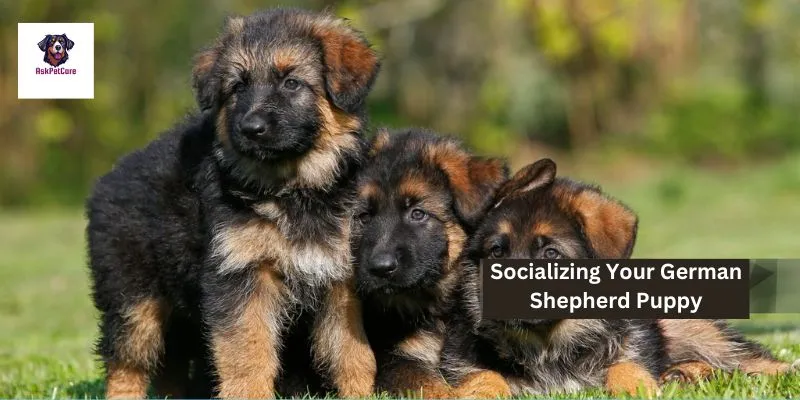
Socializing a German Shepherd puppy should start as early as possible and continue throughout their first year of life. Here are fifteen key points regarding when to socialize a German Shepherd puppy:
- Early Start: Begin socialization as soon as you bring your German Shepherd puppy home, ideally between 7 to 16 weeks of age, which is the critical socialization period.
- First Few Weeks: Focus on gentle handling, positive interactions, and exposure to new sights and sounds within the safety of your home environment.
- Vaccination Schedule: Ensure your puppy receives their vaccinations on time, but don’t wait until they’re fully vaccinated to start socialization. Consult your veterinarian for advice on balancing socialization and vaccination needs.
- Positive Experiences: Introduce your puppy to new people, animals, environments, and experiences in a positive and controlled manner to build their confidence and trust.
- Consistency: Make socialization a consistent part of your puppy’s routine, incorporating short, frequent sessions into their daily schedule.
- Structured Socialization: Enroll your puppy in puppy socialization classes or organize playdates with other vaccinated and friendly dogs to provide structured socialization opportunities.
- Variety of Stimuli: Expose your puppy to a wide variety of stimuli, including different surfaces, textures, sounds, smells, and environments, to help them become adaptable and well-rounded.
- Supervised Interaction: Supervise all interactions between your puppy and unfamiliar people, animals, or environments to ensure their safety and comfort.
- Positive Reinforcement: Use positive reinforcement techniques such as treats, praise, and play to reward your puppy for calm and friendly behavior during socialization.
- Gradual Exposure: Gradually expose your puppy to new experiences, starting with less overwhelming stimuli and gradually increasing the intensity as they become more comfortable.
- Avoid Overstimulation: Be mindful of your puppy’s stress levels and avoid overwhelming them with too many new experiences at once. Allow them time to decompress and rest between socialization sessions.
- Ongoing Socialization: Continue socializing your German Shepherd puppy beyond the critical period, incorporating new experiences and challenges into their routine as they grow and develop.
- Positive Associations: Create positive associations with new people, places, and experiences by pairing them with treats, toys, and affection to reinforce positive behavior.
- Adapt to Individual Needs: Be flexible and adapt your socialization approach based on your puppy’s personality, temperament, and comfort level with different situations.
- Lifelong Process: Understand that socialization is a lifelong process, and continue to expose your German Shepherd to new experiences and environments throughout their life to maintain their social skills and confidence.
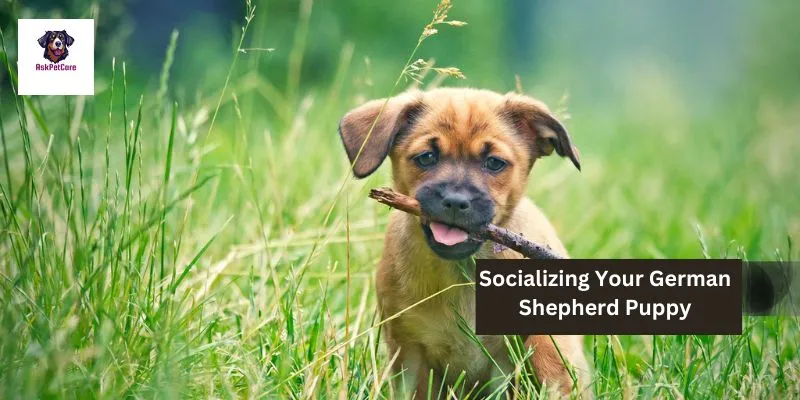
Are German Shepherds puppies hard to socialize?
German Shepherd puppies can present unique challenges when it comes to socialization due to their breed traits and individual personalities. Here are ten points highlighting why German Shepherd puppies might be considered challenging to socialize:
- Strong Guardian Instincts: German Shepherds have strong protective instincts, which can sometimes lead to wariness or suspicion towards unfamiliar people or animals, requiring careful socialization to prevent fear-based behaviors.
- Reserved Nature: Some German Shepherd puppies naturally have a reserved or aloof demeanor, which may require more time and patience to socialize effectively compared to more outgoing breeds.
- Sensitivity to Environment: German Shepherds can be sensitive to their environment, making them more prone to stress or anxiety in new or unfamiliar situations, which can complicate the socialization process.
- Selective Socialization: German Shepherds may exhibit selective socialization tendencies, preferring certain individuals or dogs over others, which requires targeted socialization efforts to ensure they are comfortable with a variety of people and animals.
- High Energy Levels: Their high energy levels and enthusiasm can sometimes be intimidating to other dogs or people, making it important to teach them appropriate social behaviors and boundaries during interactions.
- Protective of Territory: German Shepherds have a natural inclination to protect their territory, which can manifest as territorial aggression if not properly socialized to accept visitors or unfamiliar dogs in their space.
- Size and Strength: As large and powerful dogs, German Shepherd puppies need to learn proper social manners and restraint to prevent accidental harm or intimidation towards smaller animals or people.
- Independent Thinking: German Shepherds are intelligent and independent thinkers, which can sometimes result in stubbornness or resistance to socialization efforts, requiring consistent and patient training techniques.
- Prey Drive: Some German Shepherds have a strong prey drive, which may lead to chasing or aggressive behavior towards smaller animals if not properly socialized and trained from a young age.
- Potential for Fearfulness: Due to their sensitive nature, German Shepherd puppies may be more prone to developing fear-based behaviors if not exposed to a wide range of positive experiences during the critical socialization period.
While German Shepherd puppies may present challenges in the socialization process, with proper guidance, patience, and positive reinforcement, they can develop into well-adjusted and confident adult dogs. Consistent socialization efforts tailored to their individual needs are essential for ensuring their success as friendly and sociable companions.
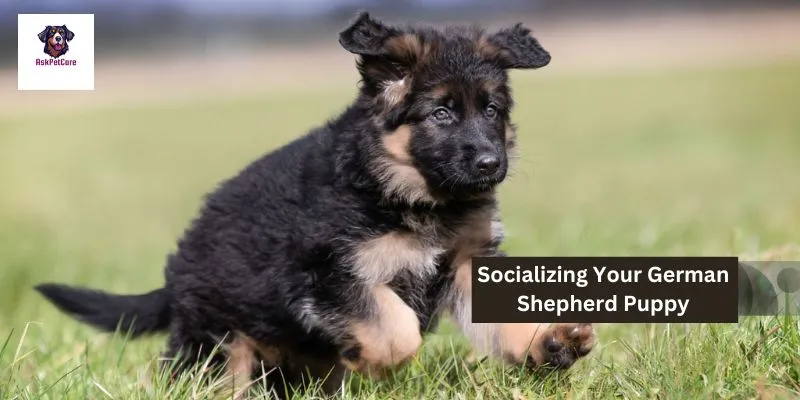
How to Socialize Aggressive German Shepherd.
Socializing an aggressive German Shepherd requires a specialized and careful approach to address underlying behavioral issues and build trust and confidence. Here’s a step-by-step guide:
- Understand the Root Cause:
- Identify the triggers and underlying reasons for your German Shepherd’s aggression. It could stem from fear, lack of socialization, past trauma, or genetics.
- Consult a Professional:
- Seek guidance from a certified dog trainer or behaviorist experienced in dealing with aggression in German Shepherds. They can assess your dog’s behavior and create a customized training plan.
- Create a Safe Environment:
- Establish a safe space for your dog where they can feel secure and relaxed. Minimize exposure to triggers that provoke aggression and provide plenty of mental and physical stimulation.
- Positive Reinforcement Training:
- Use positive reinforcement techniques to encourage desired behaviors and reshape your dog’s response to triggers. Reward calm and non-aggressive behavior with treats, praise, and toys.
- Desensitization and Counterconditioning:
- Gradually expose your dog to the triggers of their aggression in a controlled and systematic manner. Pair the presence of triggers with positive experiences, such as treats or playtime, to create new, positive associations.
- Behavior Modification Exercises:
- Implement behavior modification exercises to teach alternative behaviors to replace aggression. This could include teaching your dog to focus on you, follow commands, or engage in calm activities.
- Consistency and Patience:
- Be consistent in your training efforts and patient with your dog’s progress. Addressing aggression takes time and dedication, and setbacks may occur along the way. Stay committed to the process and celebrate small victories.
- Avoid Punishment:
- Refrain from using punishment-based methods or harsh corrections, as they can exacerbate aggression and damage the bond between you and your dog. Focus on positive reinforcement and gentle guidance instead.
- Gradual Exposure to Socialization:
- Introduce your dog to new people, animals, and environments slowly and under controlled conditions. Monitor their behavior closely and intervene if signs of aggression arise. Gradually increase exposure as your dog becomes more comfortable and confident.
- Continued Support and Monitoring:
- Stay proactive in managing your dog’s aggression by continuing training efforts and seeking ongoing support from professionals. Monitor your dog’s progress closely and make adjustments to the training plan as needed.
Remember, addressing aggression in German Shepherds requires patience, consistency, and a commitment to positive reinforcement techniques. With the right approach and guidance, you can help your dog overcome their aggression and become a well-adjusted and sociable companion.
| Step | Description |
| Understand the Root Cause | Identify the reasons behind your German Shepherd’s aggression, such as fear or lack of socialization. |
| Consult a Professional | Seek guidance from a certified dog trainer or behaviorist experienced in addressing aggression in dogs. |
| Create a Safe Environment | Establish a secure space for your dog and minimize exposure to triggers that provoke aggression. |
| Positive Reinforcement | Use treats, praise, and toys to encourage calm behavior and reshape your dog’s response to triggers. |
| Desensitization & Counterconditioning | Gradually expose your dog to triggers while pairing them with positive experiences to create new associations. |
| Behavior Modification | Teach alternative behaviors to replace aggression, such as focusing on you or engaging in calm activities. |
| Consistency & Patience | Stay committed to the training process and celebrate small victories, understanding that progress takes time. |
| Avoid Punishment | Refrain from using punishment-based methods, as they can worsen aggression and damage your bond with the dog. |
| Gradual Exposure | Introduce your dog to new people, animals, and environments slowly and under controlled conditions. |
| Continued Support | Seek ongoing guidance from professionals, monitor progress closely, and make adjustments to the training plan. |
When should I socialize my German Shepherd puppy?
Socialization should begin as early as possible, ideally between 7 to 16 weeks of age. This critical period is when puppies are most receptive to new experiences and less likely to develop fear or anxiety toward novel stimuli. Early socialization helps your German Shepherd puppy build confidence, develop positive associations with people, animals, and environments, and learn appropriate social skills. However, socialization should continue throughout your puppy’s first year and beyond to reinforce positive behaviors and maintain their sociability.
How do I train my German Shepherd puppy to be friendly?
Training your German Shepherd puppy to be friendly involves a combination of socialization, positive reinforcement, and obedience training. Here are some steps to follow:
- Early Socialization: Introduce your puppy to various people, animals, and environments in a positive and controlled manner.
- Positive Reinforcement: Use treats, praise, and toys to reward friendly behavior towards people and other animals.
- Obedience Training: Teach basic commands like “sit,” “stay,” and “come” to promote good manners and communication.
- Exposure to Different Situations: Gradually expose your puppy to different situations, noises, and stimuli to build confidence and prevent fearfulness.
- Consistency and Patience: Be consistent in your training efforts and patient with your puppy’s progress, celebrating small victories along the way.
By focusing on positive experiences and rewards, you can encourage your German Shepherd puppy to be friendly, sociable, and well-mannered.
How do you socialize a protective German Shepherd?
Socializing a protective German Shepherd requires patience, consistency, and positive reinforcement techniques. Here’s how to approach it:
- Gradual Exposure: Introduce your German Shepherd to new people, animals, and situations gradually, starting with familiar and non-threatening environments.
- Positive Reinforcement: Reward calm and friendly behavior with treats, praise, and affection to reinforce positive associations.
- Desensitization: Gradually expose your dog to triggers of their protective behavior while providing positive experiences to change their response.
- Obedience Training: Teach your German Shepherd basic commands like “leave it” and “down” to redirect their attention and manage protective tendencies.
- Professional Guidance: Seek advice from a certified dog trainer or behaviorist experienced in working with protective breeds to develop a tailored socialization plan.
By addressing your German Shepherd’s protective instincts through positive socialization, you can help them become well-adjusted and confident companions.
How do I bond with my German Shepherd puppy?
Bonding with your German Shepherd puppy is essential for building a strong and trusting relationship. Here are some tips to foster a deep bond:
- Quality Time Together: Spend dedicated time with your puppy through play, training sessions, and leisure activities to strengthen your bond.
- Physical Affection: Offer plenty of physical affection through gentle petting, cuddling, and grooming to build trust and create positive associations.
- Training and Communication: Use positive reinforcement training methods to teach your puppy basic commands and establish clear communication.
- Exploration and Adventure: Take your puppy on walks, hikes, and outings to explore new environments together and share exciting experiences.
- Consistency and Routine: Maintain a consistent daily routine for feeding, exercise, and bonding activities to provide stability and security for your puppy.
By investing time, patience, and love into your relationship with your German Shepherd puppy, you can develop a lifelong bond built on mutual trust, respect, and companionship.
Here are some reference books that are considered authoritative on the topic of dog care, including nail care:
- “The Complete Dog Owner’s Manual” by Dr. Bruce Fogle
- “The Ultimate Guide to Dog Care: Everything You Need to Know to Keep Your Dog Happy and Healthy” by Amy Marder and Andrew Luescher
- “The Veterinarians’ Guide to Natural Remedies for Dogs: Safe and Effective Alternative Treatments and Healing Techniques from the Nations Top by Martin Zucker
